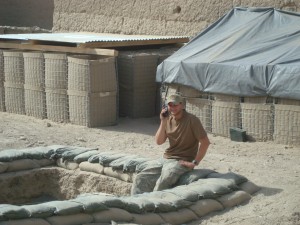Telling the Truth: Timing is Everything
By paul • Feb 8th, 2009 • Category: Communication, Featured, RelationshipsDuring difficult times like deployments we naturally never want to pile on or bring unnecessary stress on each other. Some couples and families choose to censor their experiences both on the homefront and on the front line. There are many degrees of censorship that loved ones practice during deployments and each family must decide what is right for them.
For me, I had to tell Katie everything (at least mostly everything – Katie didn’t need to know we had a contracted baker that cooked fresh, delicious pies every night when we were back refitting on the main FOB). Being so far away I knew the truth would always be the glue that held us together. I always wanted her to have the whole picture so she could understand those days when I was angry on the phone or when I was rushed. There were no surprises. If I lied to Katie and told her not to worry because I was working a desk job, how could I tell her about some of the most significant events that took place during my wartime experience? For example, the first time I killed a Taliban insurgent was a very traumatic day for me and something I had to share with my wife. Not telling the truth only limits what you can and can’t talk about during the times you need to talk the most.
At the same time, as a soldier I always wanted to know what was going on back home. Yes, sometimes I would hear something that would create more stress in my life and I would get frustrated. An unforeseen veterinarian bill or a leaky roof will raise your blood pressure, but I knew I would be twice as stressed to come home to a collapsed roof or a dead pet. At some point I had to realize I was an adult and fully capable of dealing with my entire life. Just because I was deployed fighting a war did not give me a license to ignore my responsibilities at home. My life back home hadn’t stopped, I just wasn’t the homefront quarterback. I was more like the back up quarterback with the clipboard calling in suggestions from the sidelines.
With that said, there is a proper time to discuss undesirable truths. Don’t drop bombs at inappropriate times. While I was on my mid tour leave enjoying time with Katie in Australia one of my best friends was killed in an IED blast. My team in Afghanistan knew I would be devastated and chose not to call me until the night before I returned, ensuring I would enjoy my entire vacation. Once the appropriate time presented itself they told me the truth so that I could deal with it.
I have also seen the truth exposed at the wrong time – usually during disagreements. Katie and I could be having an argument over the house maintenance priorities and in a desperate need to trump her I would throw out a hidden truth. “Well you didn’t just lose a soldier today,” I would say, trying gain some type of upper hand. Informing her of the loss of a soldier during the disagreement was poor timing and a cheap shot.
Communicating during deployment is a lot like “Double Dutch:” timing is everything. No matter what strategy you adapt just remember to establish it early, preferably before the deployment. Then as the two jump ropes of your life swing in unison you will be able to establish a rhythm that will help keep you from tripping.

paul is wondering about the next step. How do I translate the sense of purpose and direction I felt in the combat zone into meaning in my 'regular' life?
Email this author | All posts by paul







